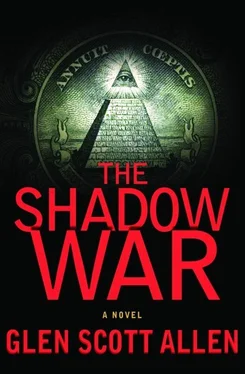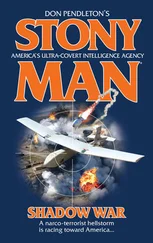Glen Allen - The shadow war
Здесь есть возможность читать онлайн «Glen Allen - The shadow war» весь текст электронной книги совершенно бесплатно (целиком полную версию без сокращений). В некоторых случаях можно слушать аудио, скачать через торрент в формате fb2 и присутствует краткое содержание. Жанр: Триллер, на английском языке. Описание произведения, (предисловие) а так же отзывы посетителей доступны на портале библиотеки ЛибКат.
- Название:The shadow war
- Автор:
- Жанр:
- Год:неизвестен
- ISBN:нет данных
- Рейтинг книги:5 / 5. Голосов: 1
-
Избранное:Добавить в избранное
- Отзывы:
-
Ваша оценка:
- 100
- 1
- 2
- 3
- 4
- 5
The shadow war: краткое содержание, описание и аннотация
Предлагаем к чтению аннотацию, описание, краткое содержание или предисловие (зависит от того, что написал сам автор книги «The shadow war»). Если вы не нашли необходимую информацию о книге — напишите в комментариях, мы постараемся отыскать её.
The shadow war — читать онлайн бесплатно полную книгу (весь текст) целиком
Ниже представлен текст книги, разбитый по страницам. Система сохранения места последней прочитанной страницы, позволяет с удобством читать онлайн бесплатно книгу «The shadow war», без необходимости каждый раз заново искать на чём Вы остановились. Поставьте закладку, и сможете в любой момент перейти на страницу, на которой закончили чтение.
Интервал:
Закладка:
Benjamin put his few things away-the room was very well apportioned with armoire, bookcase, several chairs, a small table he imagined could serve as a desk, everything in the dark, polished wood and satin of the Federalist style-and then looked about the room, wondering how long before Wolfe returned with food, as he hadn't eaten since the morning and was in fact starving.
It was then he noticed three books placed on one of the nightstands.
The first two were The European amp; the Indian and 1676: The End of American Independence. Both were books he recognized from his own work in Colonial history. Perhaps these were the "bit of a snag" Jeremy had referred to?
But the third was a slim volume, roughly eight by eleven inches, clearly very old, bound in thick red water-stained pasteboard. The title- A Brief History of the Reverend Harlan Phlegon Bainbridge: His Vision and His Tragedy -was stamped onto the cover.
Benjamin went suddenly white.
He recognized the name-how could he not? His father's book-his uncompleted book, and all those years of research-had partially been about the Reverend Hessiah Philadephia Bainbridge. And Harlan, he knew, was Hessiah's son. But while Hessiah had been the subject of several books on Colonial Puritan history, almost nothing was known of his son, Harlan. And in all his studies, in all his father's studies, Benjamin had never heard of this book.
How on earth had Jeremy come across it?
At that moment Wolfe returned. He was carrying a tray with small plates of sliced turkey and ham, some yellow cheese, and a bowl of black olives. He'd also brought a pot of coffee, as well as a full bottle of Glenlivet scotch.
As Wolfe set the tray down on a little round side table near Benjamin's bed, he saw Benjamin eyeing the coffee and whiskey. Wolfe poured himself a tumbler of the scotch.
"Nightcap?" Wolfe asked.
"Uh, no, no thanks," said Benjamin. "I just wake up later and-"
"Capital," said Wolfe. He poured another tumbler and handed it to Benjamin. "I hate to nightcap alone."
He tapped Benjamin's glass with his own, then downed half of his at a single gulp. Benjamin sighed, lifted his glass to his lips, and sipped. It was very strong scotch, and Benjamin had always preferred gin. But then as the aftertaste faded it left a warm glow going down. He took another sip.
"Attaboy, Benny," said Wolfe. He sat down in a chair beside the bed, crossed his legs, again in a move of almost antique elegance.
"Uh, Mr. Wolfe, could we get one thing straight?" Benjamin sat down on the bed, the slim red book still in one hand, and began picking at the meat and cheese from the plate.
"What's that?"
"Could you stop calling me Benny?"
Wolfe smiled broadly. "Do you have a middle name?"
Benjamin sighed. "Franklin."
Wolfe's eyes went wide. " Mein Gott! Benjamin Franklin Wainwright?" Benjamin nodded. Wolfe raised his glass. "Here's to Ben Franklin, Colonial scholar." This time Benjamin joined him in drinking. "How on earth did that happen?" Wolfe asked.
"My father was an historian, too, and a fan of the Founding Fathers. He always said it that way, capitalized. When he spoke of Thomas Jefferson, sometimes I could swear there were tears in his eyes." He took another sip of the scotch. Winced.
"But then why aren't you Thomas Jefferson Wainwright?"
Benjamin laughed. "My father admired Jefferson tremendously, but he thought Franklin a little more… human."
"Human?" asked Wolfe.
"Maybe colorful is a better word. There was this letter my father showed me when he thought I was of the… proper age; a letter Franklin had written to a friend who'd asked his advice about the best way to conduct 'discreet affairs.' The letter wasn't published until the 1920s, for fear it would damage the reputation of so respected a Founding Father." Benjamin took another sip of the scotch. "In the letter, Franklin lists eight reasons it is best to have such affairs with older women, the last one being 'because they are so grateful!' "
Wolfe laughed sharply. "Very strategic thinking."
Wolfe was exhibiting his ingratiating smile, and Benjamin couldn't help feeling a growing affection for the man. He thought of what Terrill had told him downstairs. He decided the circumstances were ripe for a little prying.
"Strategic thinking… that's what got you into the security business?"
Wolfe looked at him and the smile disappeared.
"Vietnam," he said. "I was too eager for the Canadian option, too bright to sling an M-16. So they put me into military intelligence. God," Wolfe laughed, drinking again. "There's the mother of all oxymorons."
"But how does that lead…"
"Here?" Wolfe indicated the room, the grounds, the situation with a whirl of his empty tumbler.
Which brought his attention to his glass. He leaned over to pour another drink-then put the cork back into the bottle.
"Another time, Benjamin. It's getting late, and you have some homework to do." He pointed to the book in Benjamin's hand and the two on the table. "I found those in Fletcher's room. They seemed distinctly different from the bulk of his reading material, all that nuclear apocalypse gloom and doom. I thought you could take a look at them, give us a head start in the morning." Then Wolfe stood up to leave.
"But how do you know Arthur will keep me around now that Jeremy…" Again he couldn't bring himself to say it.
"He was a good friend?"
Wolfe's sympathy sounded sincere, so he gave a sincere answer. "Not for years now. But once, yes."
"Don't worry about Arthur. I think I managed to… divert him from a precipitous decision. And tomorrow is another day." He smiled broadly.
Again Wolfe made ready to leave, and again Benjamin stopped him.
"Divert?" he asked. "You mean that spilled drink, that was…"
Wolfe smirked. "Distraction. All the best illusionists use it."
"Uh-huh," replied Benjamin. "But even if I stay, what exactly is it we're supposed to do tomorrow morning?"
Wolfe smiled at him. "Like I said, look for leaks," he said. "Beginning, like all good detective novels, at the scene of the… crime?" Then Wolfe gave him a curt salute, said good night, and pulled the door shut.
Benjamin sat for a moment, wondering what Wolfe had meant by "leaks." Or, for that matter, "crime." Terrill had introduced Wolfe as a security analyst… Was there some suspicion Jeremy had been leaking information? That seemed unthinkable.
He shook his head. He was accustomed to the hard reality of print, not this conjecturing out of thin air. Perhaps a little of that black-and-white certainty of print would set him right.
He moved the food tray off the bed, scooted back so he could lean against the headboard as he looked through Fletcher's books.
He picked up the slim volume about Bainbridge, the book he'd never heard of before. He turned it back and forth. The ornate binding, the thick pages… it seemed like the sort of book custom-produced for rich bibliophiles. On the first page, below the title, was the author's name: Warren Ginsburg. And under that was typed, Fellow of the Heritage Institute for Good Government.
Heritage Institute? Some earlier incarnation of the Foundation? If so, he hadn't realized the Foundation had been around that long, all the way back to-he checked the date on the title page-1929.
Then he noticed beneath that a stamp, the sort of seal placed in valuable books by people who collect such things. With some difficulty, he read the embossed letters printed in a circle. The Library of Seymour H. Morris.
The name sounded vaguely familiar, but he couldn't quite place it. He turned the page. Here, Ginsburg had quoted from Hobbes: By art is created that great Leviathan, called a Commonwealth or State-(in Latin, Civitas) which is but an artificial man. And beneath this, written in purple ink now faded with age, was written To Cecil, our modern Bainbridge, with concern amp; hope on this Brave New Century's longest day-Warren, 10/29/1929.
Читать дальшеИнтервал:
Закладка:
Похожие книги на «The shadow war»
Представляем Вашему вниманию похожие книги на «The shadow war» списком для выбора. Мы отобрали схожую по названию и смыслу литературу в надежде предоставить читателям больше вариантов отыскать новые, интересные, ещё непрочитанные произведения.
Обсуждение, отзывы о книге «The shadow war» и просто собственные мнения читателей. Оставьте ваши комментарии, напишите, что Вы думаете о произведении, его смысле или главных героях. Укажите что конкретно понравилось, а что нет, и почему Вы так считаете.












